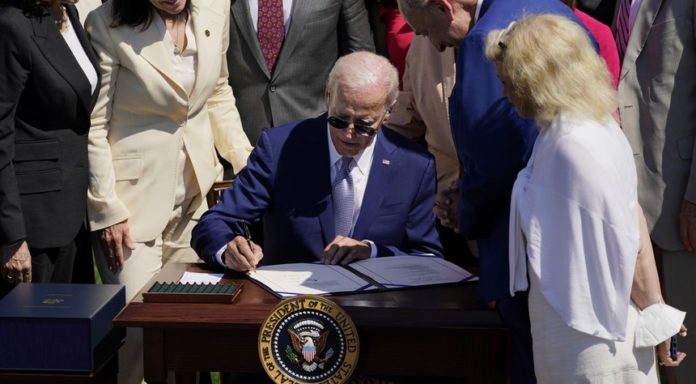It seems as though the Inflation Reduction Act will soon be passed by the U.S. House of Representatives, and signed into law within the next few hours by President Biden.
The so-called Inflation Reduction Act, (IRA), will not make Americans’ lives easier. It will not lower inflation. It won’t increase economic growth. It won’t incubate innovation or entrepreneurship. It will not lower the tax burden on hardworking Americans. It will not reduce the amount of red tape that drains the U.S. economy’s energy. It will not reduce the annual deficit or the national debt. It won’t spur job creation. It won’t lead to increased wages for ordinary Americans. It won’t make fuel, food, housing, or other items of significant importance more affordable.
The IRA offers many benefits to those who support a larger government.
The bill will six-fold increase the budget of the Internal Revenue Service (IRS). This bill will add 87,000 IRS agents to the ranks. They will be responsible for increasing tax enforcement through more audits of small businesses, self-employed Americans, and other means.
The IRS currently has 93 654 employees. In one swift move, Congress seeks to nearly double the workforce of the most fearful department of the federal government.
The bill’s text states that “nothing in this section is meant to increase taxes on any taxpayer, small business, or individual with a taxable income less than $400,000. This section does not intend to raise taxes on taxpayers who are not among the top 1%.
Pay attention to the repeated phrase “is intended too”, which is repeated two times. The bill’s authors chose to use “is intended” instead of “shall.”
According to IRS data, Americans who earn more than $400,000 per year make up 1.8 percent of all taxpayers. However, they account for approximately 25 percent of the country’s income tax revenue. The vast majority of income taxes in the country are paid by those earning less than $400,000 per annum (98.21% of taxpayers), which is 75 percent of the total burden.
The Wall Street Journal reports that “The Joint Committee on Taxation is Congress’s official tax scorekeeper.” According to The Wall Street Journal, 78% to 90% of the money raised from under-reported income will likely come from people making less than $200,000 per year. Only 4% to 9 percent would be from people earning more than $500,000
The bill also benefits the administrative state, particularly the Environmental Protection Agency (EPA), a boon. The bill will provide $41.5 billion to the EPA for new funds. These funds will be used to combat climate change, pursue nebulous climate justice initiatives, and other related projects.
What is the impact on inflation of “The Environmental and Climate Justice Block Grants”, which are funded at $3 billion?
The bill also expands the federal government’s involvement in health care, extending Obamacare subsidies and allowing government price controls for Medicare drugs.
This is by no means a complete list of all the ways the Inflation Reduction Act can increase the government’s size and scope. It is only the tip of an iceberg. It also contains hundreds of billions in crony capitalist subsidies for electric vehicles and other renewable energy boondoggles.
Inflation Reduction Act does not reduce inflation, this is a fact that cannot be overemphasized. It is just another vast spending bill that the Biden administration and congressional Democrats seek to increase the federal government’s power, breed more dependence on the federal government and instill fear among those who dare defy it.




